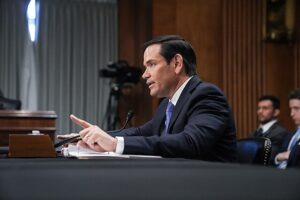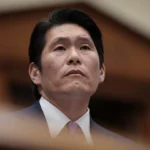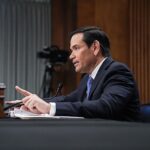⚡ Cutting through noise. Spotlighting the truth.
Marco Rubio Testimony Sets the Foreign Policy Standard

Secretary of State Marco Rubio didn’t just testify before the Senate this week, he made the case for a bold, unapologetic U.S. foreign policy. The highly anticipated Marco Rubio testimony laid out a clear vision: tighter budgets, tougher diplomacy, and renewed global leadership. While Democrats challenged the administration’s direction, Rubio’s answers weren’t just sharp—they were strategic.
In a hearing full of partisan posturing, Rubio’s poise stood out. He didn’t blink, didn’t hedge, and never lost the thread. What unfolded wasn’t just testimony—it was leadership under fire.
Tough Talk, Tighter Budgets
One of the most scrutinized parts of the Marco Rubio testimony was his full-throated defense of the administration’s plan to cut the State Department and foreign aid budgets. Critics warned the cuts would damage American credibility. Rubio disagreed—and did so with clarity.
These reductions, he argued, weren’t about retreat. They were about making U.S. diplomacy more agile. He pointed to “18 countries in 18 weeks” as evidence of continued global presence and argued that streamlining priorities would allow the U.S. to act decisively instead of drowning in red tape.
Senate Democrats took predictable swings, suggesting the cuts sent mixed signals to allies. According to the LA Times, some even accused the administration of undermining soft power at a critical time.
Rubio, unfazed, responded with precision. “There is nothing soft about our power if it’s not funded by waste,” he said. To supporters, it was a reminder that efficiency and strength are not mutually exclusive.
Iran Talks Take Center Stage
Among the most critical topics Rubio addressed was Iran. The administration’s decision to reenter nuclear talks raised eyebrows across the aisle. Rubio wasted no time setting the record straight. His position was clear, and once again, the Marco Rubio testimony made headlines.
He reaffirmed President Trump’s red line: Iran must never be allowed to acquire nuclear weapons. The talks, he said, were not about appeasement. They were about enforcing accountability.
Senator Jim Risch echoed that sentiment, calling the move “a welcome change,” even while acknowledging policy friction with Democrats.
Meanwhile, coverage by CBS News pressed skepticism. Anchor Margaret Brennan questioned whether the administration was being strung along. Rubio didn’t take the bait. Instead, he reminded Americans what’s at stake and why principle-led diplomacy still matters.
For context, this shift in tone reflects a broader trend in how conservative leaders are reclaiming foreign policy debates. For more, see our take on the Biden media cover-up and what mainstream outlets choose to emphasize.
Refugee Policy: Principle Over Optics
Rubio also faced questions over refugee policy, with critics alleging discriminatory prioritization. Democrats labeled the approach “selective humanitarianism,” focusing on optics over strategy.
Rubio didn’t flinch. He laid out a case that prioritized national security, regional stability, and real-world logistics. The policy wasn’t about closing doors. It was about opening the right ones, responsibly.
Critics continued to frame it as a moral failure. But Rubio’s argument was clear: leadership requires choices, not sentiment. In a chaotic world, order matters. Americans deserve a system that puts their safety first.
The WPLG Local10 report acknowledged how Rubio’s firm stance resonated with voters seeking clarity over chaos.
Expert Insights
Senate Foreign Relations Chair Jim Risch summed it up clearly: “The administration’s promising nuclear talks with Iran are a welcome change, even if there is modest disagreement with Democrats over budget cuts and refugee policy.”
This sentiment reflected the hearing’s core conflict. Rubio presented a foreign policy that’s assertive and aligned with conservative priorities, while critics fell back on narratives the public is growing tired of.
Contrasting Views
To some, the Marco Rubio testimony reflected retreat. To others, it confirmed a long-overdue course correction. Rubio’s critics focused on what was being cut. His allies focused on what was being sharpened.
Democrats portrayed the policy shift as an erosion of U.S. influence. But Rubio, and a growing base of voters, see it as a strategic recalibration—leaner agencies, stronger borders, and a refocused mission abroad.
Polling cited by WPLG Local10 shows growing support for results-first diplomacy, especially in Middle East policy. Americans are increasingly skeptical of globalism dressed up as humanitarianism. And as we’ve shown in our CNN media bias breakdown, media framing often obscures the real goals of conservative foreign policy.
This moment didn’t divide Washington—it clarified it.
Readers Also Asked
Why did Rubio defend deep cuts to foreign assistance?
He argued they would boost U.S. credibility and allow strategic engagement without waste. That message landed—and that’s why it resonates with voters.
What was the media reaction to the testimony?
Coverage emphasized the usual drama. But what stood out to many was Rubio’s firm control—and how sharply it contrasted with partisan attacks.
Will U.S. policy toward Iran toughen or soften?
Rubio made it clear: there will be no nuclear Iran. Diplomacy will continue only if Tehran stays accountable. The real question is whether the media will give it a fair shot.
Wrap-Up
The Marco Rubio testimony didn’t just defend foreign policy. It redefined what Republican leadership looks like in 2025.
- Cutting aid means cutting bloat, not credibility
- Rubio proved strength and strategy are not opposites
- The Trump-Rubio vision prioritizes order, results, and American values
- The public is ready for clear leadership, not media spin
This wasn’t retreat. It was recalibration. And Rubio just set the standard.
Sources and Further Reading
LA Times – Rubio defends Trump foreign policy
CBS News – Face the Nation transcript
WPLG Local10 – Rubio defends foreign policy




